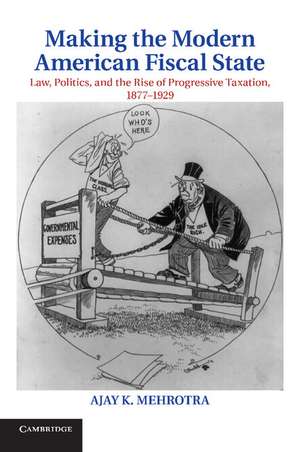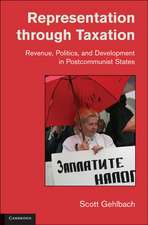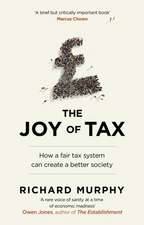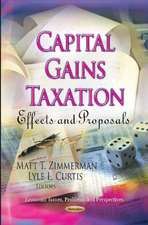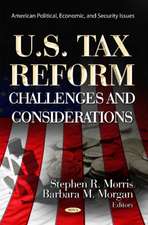Making the Modern American Fiscal State: Law, Politics, and the Rise of Progressive Taxation, 1877–1929: Cambridge Historical Studies in American Law and Society
Autor Ajay K. Mehrotraen Limba Engleză Paperback – 10 sep 2014
| Toate formatele și edițiile | Preț | Express |
|---|---|---|
| Paperback (1) | 278.34 lei 6-8 săpt. | |
| Cambridge University Press – 10 sep 2014 | 278.34 lei 6-8 săpt. | |
| Hardback (1) | 532.22 lei 6-8 săpt. | |
| Cambridge University Press – 29 sep 2013 | 532.22 lei 6-8 săpt. |
Din seria Cambridge Historical Studies in American Law and Society
-
 Preț: 282.48 lei
Preț: 282.48 lei - 8%
 Preț: 392.23 lei
Preț: 392.23 lei -
 Preț: 350.46 lei
Preț: 350.46 lei -
 Preț: 179.45 lei
Preț: 179.45 lei -
 Preț: 266.97 lei
Preț: 266.97 lei -
 Preț: 180.21 lei
Preț: 180.21 lei -
 Preț: 375.69 lei
Preț: 375.69 lei -
 Preț: 294.57 lei
Preț: 294.57 lei - 11%
 Preț: 689.78 lei
Preț: 689.78 lei -
 Preț: 438.66 lei
Preț: 438.66 lei -
 Preț: 278.29 lei
Preț: 278.29 lei - 14%
 Preț: 759.00 lei
Preț: 759.00 lei -
 Preț: 239.66 lei
Preț: 239.66 lei -
 Preț: 188.27 lei
Preț: 188.27 lei -
 Preț: 409.22 lei
Preț: 409.22 lei -
 Preț: 287.07 lei
Preț: 287.07 lei -
 Preț: 274.88 lei
Preț: 274.88 lei - 14%
 Preț: 803.54 lei
Preț: 803.54 lei -
 Preț: 436.55 lei
Preț: 436.55 lei -
 Preț: 272.75 lei
Preț: 272.75 lei -
 Preț: 224.06 lei
Preț: 224.06 lei -
 Preț: 224.24 lei
Preț: 224.24 lei -
 Preț: 322.12 lei
Preț: 322.12 lei -
 Preț: 239.48 lei
Preț: 239.48 lei - 11%
 Preț: 652.59 lei
Preț: 652.59 lei -
 Preț: 269.09 lei
Preț: 269.09 lei -
 Preț: 312.62 lei
Preț: 312.62 lei - 14%
 Preț: 792.72 lei
Preț: 792.72 lei - 14%
 Preț: 687.06 lei
Preț: 687.06 lei -
 Preț: 270.63 lei
Preț: 270.63 lei -
 Preț: 268.51 lei
Preț: 268.51 lei -
 Preț: 439.80 lei
Preț: 439.80 lei - 11%
 Preț: 614.34 lei
Preț: 614.34 lei - 11%
 Preț: 654.29 lei
Preț: 654.29 lei
Preț: 278.34 lei
Nou
Puncte Express: 418
Preț estimativ în valută:
53.27€ • 57.84$ • 44.74£
53.27€ • 57.84$ • 44.74£
Carte tipărită la comandă
Livrare economică 22 aprilie-06 mai
Preluare comenzi: 021 569.72.76
Specificații
ISBN-13: 9781107619739
ISBN-10: 1107619734
Pagini: 446
Ilustrații: 8 b/w illus.
Dimensiuni: 153 x 230 x 26 mm
Greutate: 0.65 kg
Editura: Cambridge University Press
Colecția Cambridge University Press
Seria Cambridge Historical Studies in American Law and Society
Locul publicării:New York, United States
ISBN-10: 1107619734
Pagini: 446
Ilustrații: 8 b/w illus.
Dimensiuni: 153 x 230 x 26 mm
Greutate: 0.65 kg
Editura: Cambridge University Press
Colecția Cambridge University Press
Seria Cambridge Historical Studies in American Law and Society
Locul publicării:New York, United States
Cuprins
List of tables, charts, and illustrations; Acknowledgments; Introduction; Part I. The Old Fiscal Order: 1. The growing social antagonism: partisan taxation and the early resistance to fiscal reform; 2. The gradual demise: modern forces, new concepts, and economic crisis; Part II. The Rise of the Modern Fiscal State: 3. The response to Pollock: navigating an intellectual middle ground; 4. The factories of fiscal innovation: institutional reform at the state and local level; 5. Corporate capitalism and constitutional change: the legal foundations of the modern fiscal state; Part III. Consolidating the New Fiscal Order: 6. Lawyers, guns, and public monies: the US treasury, World War I, and the administration of the modern fiscal state; 7. The paradox of retrenchment: postwar Republican ascendancy and the resiliency of the modern fiscal state; Conclusion; Index.
Recenzii
'Mehrotra has crafted a narrative that is fundamental to understanding the modern American state. By unearthing the intellectual, economic, political, and emotional spade work required to lay the groundwork for a major conceptual change in public policy, he shows how a highly decentralized, politicized, and indirect method of taxation was transformed into a centralized, neutrally administered, direct method of taxation with great potential to achieve redistributive ends.' Brian Balogh, University of Virginia
'An important contribution to the intellectual, economic, legal, and political history of the American system of taxation; a much needed exploration of the way in which the progressive income tax replaced an earlier system of tariffs and miscellaneous imposts. Because taxes are the fuel that keeps the machinery of government going and that, in large measure, determine how much government can actually do, a rigorous and comprehensive exploration of how the system developed helps us understand our present situation and where, perhaps, we might be heading.' Lawrence M. Friedman, Stanford Law School
'A fascinating, nuanced account of the intellectual and legal roots of modern progressive taxation in the United States, which established a new form of fiscal citizenship, a newly muscular administrative apparatus, and a new set of revenues that would fuel the American century, but also foreclosed other options. A must-read for those interested in the formation of the American state and the origins of contemporary tax politics.' Andrea Louise Campbell, Massachusetts Institute of Technology
'In this panoramic interpretation of taxation, Mehrotra convincingly demonstrates that the modern state owes its very existence to a reconceptualization of communal responsibility in which the 'ability to pay' became a moral obligation and, thus, a policy principle.' Richard Bensel, Cornell University, New York
'Mehrotra's book refines and extends the historical narrative on the rise of modern American statecraft. The development of the new tax systems this book cogently documents not only allowed a relatively young and newly emergent nation to participate meaningfully in world affairs, but also firmly established modes of governance that would ultimately define the reformist political economy of the mid-twentieth-century United States.' Michael A. Bernstein, Tulane University, Louisiana
'This is a truly impressive work of legal historical scholarship - thoroughly researched, well written, and powerfully argued. Mehrotra also offers a masterful demonstration of scholarly synthesis, artfully weaving together an intricate tapestry of economics, politics, law, and social history … This book serves as a model for legal historians who are looking to integrate fine-grained, nuanced analyses of historical events and actors with the kind of big-picture ideas that most readily engage our fellow legal scholars. This is a book that illuminates a fundamental transformation of the American state, a transformation in whose shadow we obviously live today.' Christopher Schmidt, Jotwell
'This book deserves to be (and, I predict, will become) the standard account of a major transition in the history of American governance: from a tax regime that was predominantly regressive, indirect, and centered on federal customs duties to one far more progressive, direct, and centered on the federal income tax.' Nicholas R. Parrillo, The Journal of American History
'Making the Modern American Fiscal State will be essential reading for US historians, historians of other modern fiscal states, and anyone interested in the historical roots of contemporary political debates about wealth, power, and inequality … any student of these subjects will be indebted to Mehrotra's rich analysis. This is the sort of book that bears the mark of a long gestation - that was worth it.' Jonathan Levy, American Historical Review
'How is a fiscal state crafted? What is fiscal citizenship? It is with these fundamental questions that this fascinating, well-written, thoroughly researched, and convincing book wrestles. This book is not only for those dedicated to the history of taxation; readers with an interest in the history of economics, the rise of professionalism and expertise (particularly of the legal and economic varieties), politics, populism, and propaganda will also find Mehrotra's book thought provoking.' Carolyn Jones, Law and History Review
'An important contribution to the intellectual, economic, legal, and political history of the American system of taxation; a much needed exploration of the way in which the progressive income tax replaced an earlier system of tariffs and miscellaneous imposts. Because taxes are the fuel that keeps the machinery of government going and that, in large measure, determine how much government can actually do, a rigorous and comprehensive exploration of how the system developed helps us understand our present situation and where, perhaps, we might be heading.' Lawrence M. Friedman, Stanford Law School
'A fascinating, nuanced account of the intellectual and legal roots of modern progressive taxation in the United States, which established a new form of fiscal citizenship, a newly muscular administrative apparatus, and a new set of revenues that would fuel the American century, but also foreclosed other options. A must-read for those interested in the formation of the American state and the origins of contemporary tax politics.' Andrea Louise Campbell, Massachusetts Institute of Technology
'In this panoramic interpretation of taxation, Mehrotra convincingly demonstrates that the modern state owes its very existence to a reconceptualization of communal responsibility in which the 'ability to pay' became a moral obligation and, thus, a policy principle.' Richard Bensel, Cornell University, New York
'Mehrotra's book refines and extends the historical narrative on the rise of modern American statecraft. The development of the new tax systems this book cogently documents not only allowed a relatively young and newly emergent nation to participate meaningfully in world affairs, but also firmly established modes of governance that would ultimately define the reformist political economy of the mid-twentieth-century United States.' Michael A. Bernstein, Tulane University, Louisiana
'This is a truly impressive work of legal historical scholarship - thoroughly researched, well written, and powerfully argued. Mehrotra also offers a masterful demonstration of scholarly synthesis, artfully weaving together an intricate tapestry of economics, politics, law, and social history … This book serves as a model for legal historians who are looking to integrate fine-grained, nuanced analyses of historical events and actors with the kind of big-picture ideas that most readily engage our fellow legal scholars. This is a book that illuminates a fundamental transformation of the American state, a transformation in whose shadow we obviously live today.' Christopher Schmidt, Jotwell
'This book deserves to be (and, I predict, will become) the standard account of a major transition in the history of American governance: from a tax regime that was predominantly regressive, indirect, and centered on federal customs duties to one far more progressive, direct, and centered on the federal income tax.' Nicholas R. Parrillo, The Journal of American History
'Making the Modern American Fiscal State will be essential reading for US historians, historians of other modern fiscal states, and anyone interested in the historical roots of contemporary political debates about wealth, power, and inequality … any student of these subjects will be indebted to Mehrotra's rich analysis. This is the sort of book that bears the mark of a long gestation - that was worth it.' Jonathan Levy, American Historical Review
'How is a fiscal state crafted? What is fiscal citizenship? It is with these fundamental questions that this fascinating, well-written, thoroughly researched, and convincing book wrestles. This book is not only for those dedicated to the history of taxation; readers with an interest in the history of economics, the rise of professionalism and expertise (particularly of the legal and economic varieties), politics, populism, and propaganda will also find Mehrotra's book thought provoking.' Carolyn Jones, Law and History Review
Notă biografică
Descriere
Making the Modern American Fiscal State chronicles the rise of the US system of direct and progressive taxation.
